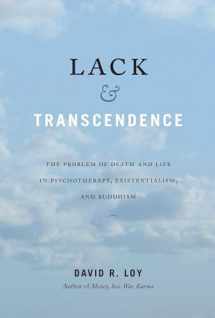
Lack & Transcendence: The Problem of Death and Life in Psychotherapy, Existentialism, and Buddhism
Book details
Summary
Description
David R. Loy draws from giants of psychotherapy and existentialism, from Nietzsche to Kierkegaard to Sartre, to explore the fundamental issues of life, death, and what motivates us.
Psychotherapy, existentialism, and Buddhism are all concerned with the same fundamental issues of life and death—and death-in-life. David R. Loy’s groundbreaking claim is that the unifying feature connecting these perspectives is a sense of pervasive sense of dissatisfaction—or, in a word, lack. In Lack & Transcendence, he brings all three traditions together in a way that casts new light on each, as he draws from giants of psychotherapy, particularly Freud, Ernest Becker, Rollo May, Irvin Yalom, and Otto Rank; great existentialist thinkers, like Nietzsche, Kierkegaard, Heidegger, and Sartre; and the teachings of Buddhism, especially as interpreted by Nagarjuna, Huineng, and Dogen.
Written in accessible style that does not assume prior familiarity with any of its subjects, this book will appeal to readers of all backgrounds, including psychotherapists and psychoanalysts, religious scholars, Continental philosophers, and anyone seeking clarity on the Great Matter itself.
The reader will come away with fresh perspectives on ancient questions and deeper insights into the human predilection to be unhappy—and what the liberating alternative may be.


We would LOVE it if you could help us and other readers by reviewing the book
Book review



